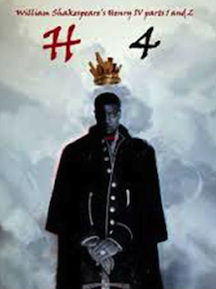By Julia Torres
Ayanna Thompson (ΦBK, Columbia University, 1994), Professor of English at George Washington University, has written a remarkable film adaptation of Shakespeare’s Henry IV Part One and Two, entitled H4. The film marks history as the first black Shakespeare film. The highly-anticipated film premiered on April 6, 2012, at the 40th annual meeting of the Shakespeare Association of America in Boston. Set in contemporary Los Angeles, H4 explores political struggles in the black community. The three central ethnic groups in conflict (the English, Scottish, and Welsh) are transposed to Haitian and Jamaican immigrants who clash with the more established African Americans in Los Angeles. The screenplay remains in Shakespeare′s original language with minor changes and cuts. For example, Falstaff calls for a cup of “malt liquor” and a capon. Another scene is set with the line: “This is Inglewood, not Guantanamo Bay—there are no hooded men.”
On her GWU faculty page, Thompson describes how her work makes her more of a “performance race scholar” than a traditional Shakespeare scholar:
“My work explores the development and cultural legacies of racial constructions in seventeenth-century England. Because of my interest in the formation and perseverance of racial constructions, my work is both historically and theoretically informed, encompassing texts from the seventeenth century to the twenty-first century.”
Her expertise in the area of race and Shakespeare is one of the reasons why H4 producer, actor, and long-time friend Harry Lennix asked her to be the screenwriter for the film. Like Thompson, Lennix felt that Shakespeare was a valuable vessel to explore contemporary political issues and race relations.
Speaking in an interview with Arizona State University, where she previously served on the humanities faculty, Thompson acknowledged that she was very new to film with only some high school and college training in theater. However, she is extensively familiar with the plays. She has written two books on the topic: Passing Strange: Shakespeare, Race, and Contemporary America (Oxford, 2011) and Performing Race and Torture on the Early Modern Stage (Routledge, 2008). She is also co-project director of “The Shakespeare Cognition Research Project: Classical Drama and Perceptions of Race,” editor of the book Colorblind Shakespeare: New Perspectives on Race and Performance (Routledge, 2006) and co-editor of Weyward Macbeth: Intersections of Race and Performance (Macmillan, 2009).
In her ASU interview, Thompson describes how she took up the enormous task of reworking the two plays into one, two-hour script. Thompson says she created the “scaffolding” first, focusing on the plays’ critical issue of the distribution of power among church, state, and local factions as ethnically diverse groups searched for an English identity. Then she switched to the “creative” effort of applying Shakespeare’s concepts to the political issues in Los Angeles’ black community.
Since its premier in early 2012, the film as toured through different film festivals. Most recently, it premiered at Chicago International Film Festival on October 19 and 20, and the Indie Memphis Film Festival on November 2.
According to IMDb, the film is scheduled for release in February 2014.
Julia Torres is a senior at Saint Joseph’s University majoring in English. She became a member of Phi Beta Kappa in 2013. Saint Joseph’s is home to the Phi of Pennsylvania Chapter of Phi Beta Kappa.




